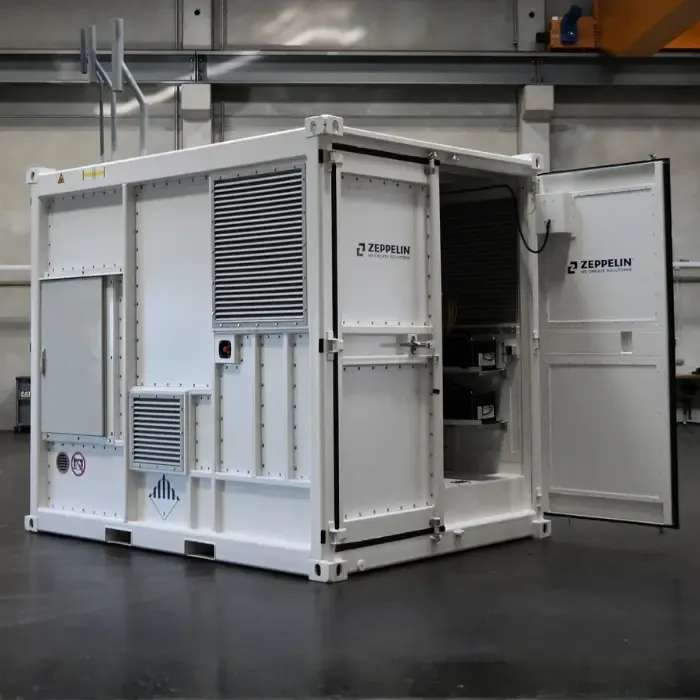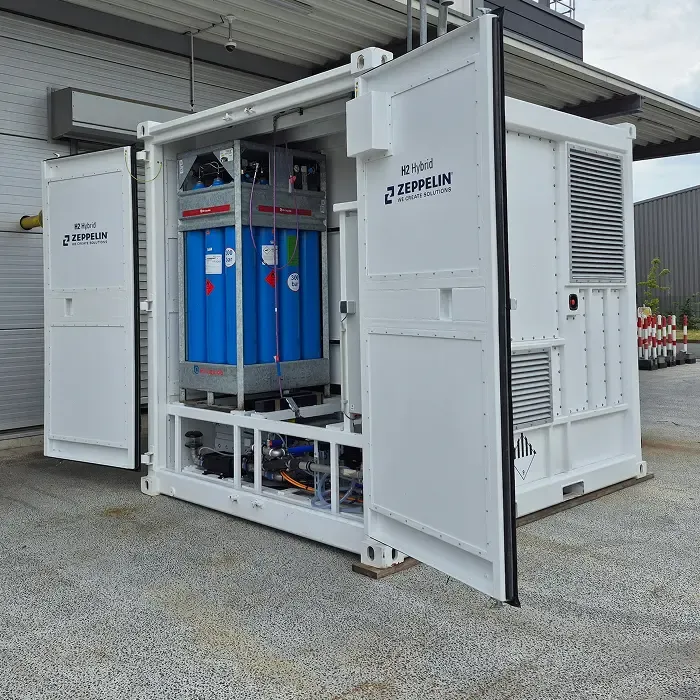Future-Proof Energy Supply at Sea: Fuel Cell Technology for Maritime Applications
Green Energy for Ships & Ports
Zeppelin Power Systems develops PEM fuel cell systems to support the maritime energy transition. Emission-free, quiet, and efficient – a sustainable alternative to diesel generators on board.
Our PEM fuel cell generators deliver clean electrical energy – ideal for use in environmentally sensitive waters, in ports with strict emission regulations, or on vessels aiming to reduce their carbon footprint. Whether as an add-on to existing systems, a zero-emission solution for auxiliary power, or a component of a hybrid energy architecture – the technology is highly versatile, suitable for both newbuilds and retrofits.
At the same time, we are continuously investing in research, development, and maritime testing environments to advance our fuel cell solutions and optimize them for real-world deployment on various types of vessels. We support you throughout the entire process – from energy system analysis and technical integration to operation and service.
Together, we shape your path into the hydrogen economy – reliably, efficiently, and CO₂-free.
Available for you 24/7
Germany
International
Efficient Fuel Cell Solutions for a Green Future
Key benefits for your organization
From Analysis to Implementation – Everything from a Single Source
We provide comprehensive support for integrating fuel cell technology into your maritime application – from initial analysis and practical testing to full implementation. Our services include technical planning, field testing, system integration, and ongoing support – all from a single provider.
Manufacturer-Independent System Integration
We deliver ready-to-use fuel cell systems – as containerized units, modular solutions, or system add-ons. Components are flexibly combined into efficient overall systems, independently of manufacturer specifications and fully aligned with your operational requirements.
System Analysis and Simulation
We evaluate your energy and propulsion architecture under maritime conditions and analyze your energy requirements based on real-world usage profiles. This includes PEM fuel cell systems and hybrid configurations with battery storage or conventional generators – to deliver technically viable, application-specific solutions.
Rental and Test Service (Try & Buy)
With our rental and testing service, you can trial fuel cell systems in your specific maritime application before making a final investment. During the trial, we collect operational data, analyze system performance under real-world conditions, and identify optimization opportunities for future integration.
Total Cost of Ownership (TCO) Analysis
Choosing a new energy system is not only a technical decision but also an economic one. We assess capital expenditure (CAPEX), operational costs (OPEX), maintenance requirements, and potential savings. This gives you a solid foundation for decision-making – whether for fleet-wide strategies or individual projects.

BSFZ Seal for Our Fuel Cell Development
Zeppelin Power Systems has been awarded the BSFZ Seal in recognition of its research and development activities in the field of fuel cell technology. The seal is granted exclusively to companies conducting in-house research and development in accordance with the German Research Allowance Act (FZulG) – a mark of our innovative strength and our commitment to a sustainable energy future.
Comprehensive Hydrogen Technology for the Maritime Sector
Whether you’re planning a newbuild, retrofitting an existing vessel, or conducting initial tests with hydrogen technology – Zeppelin Power Systems is your partner for the maritime energy transition. Talk to us about your application and requirements. Together, we will develop the right solution for your maritime future – emission-free, safe, and economically viable.
Planning
- Consulting
- Concept Development
- Project Engineering
Engineering
- Electrical & Installation Planning
- Process Technology
- CAD-based Planning
Project Management
- Site Management
- Technical Procurement
- Quality Assurance
Plant Construction
- Electrical Installation
- Assembly
- Commissioning and Test Run
Service
- Maintenance
- Routine Servicing
- Troubleshooting Service
Fuel Cell Technology for the Maritime Energy Transition
The maritime industry is under increasing pressure to reduce emissions and adopt alternative propulsion technologies – particularly in environmentally sensitive areas, during port stays, or on vessels with high onboard power demands. Hydrogen-based fuel cell systems represent a promising key technology: they generate electrical energy without CO₂ emissions, particulate matter, or nitrogen oxides – quietly, efficiently, and with scalable output.
Through the electrochemical conversion of hydrogen into electricity, PEM fuel cells offer a clean alternative to diesel generators – ideal for auxiliary power supply, as part of hybrid system architectures, or as a zero-emission solution for port operations. For shipowners, shipyards, and fleet operators, fuel cells provide an opportunity to meet regulatory requirements and transition to CO₂-neutral energy systems over the long term.
Technology Overview: PEM Fuel Cells for Maritime Use
In maritime applications, Proton Exchange Membrane Fuel Cells (PEMFC) are typically used. They are particularly well suited for variable power demands and offer an excellent balance between compact design, performance, and responsiveness. Key characteristics include:
- Low operating temperatures (60–80 °C) for fast start-up and flexible operation
- High power density for compact and modular system designs
- Dynamic load behavior, ideal for varying onboard power requirements
- Modular design, scalable from single units to multi-module systems (from a few kilowatts to the megawatt range)
PEM fuel cells require ultra-pure hydrogen (99.999%) as an energy source and produce only water and small amounts of heat as by-products – a key advantage in emission-sensitive environments.
Onboard System Integration: Requirements and Components
A maritime fuel cell system consists of more than just the fuel cell stack. It includes numerous subsystems that must be tailored to the vessel type, operating environment, and specific application requirements:
- Hydrogen supply: Pressure tanks, valves, and pressure regulation systems designed to meet maritime standards
- Air intake: Saltwater-resistant filters and compressor systems adapted to environmental conditions
- Cooling and thermal management: Specialized systems to maintain stable operating temperatures
- Humidity management: Membrane humidification systems for stable operation in changing marine climates
- Power electronics: DC/AC converters, energy management systems, and buffer batteries for integration into onboard grids
- Safety systems: Digital monitoring, hydrogen leak detection, and fire protection in compliance with maritime safety regulations
Integrating these components onboard presents specific challenges – including compatibility with existing systems, space constraints, and classification society requirements.
Research, Development, and Maritime Pilot Projects
Zeppelin Power Systems invests strategically in research, development, and real-world test environments to advance fuel cell systems for practical maritime applications. Our key areas of focus include:
- Durability and reliability: Long-term testing under real conditions, aging analysis, and design of robust systems
- Efficiency optimization: Fine-tuning partial load behavior, operating strategies, and onboard energy distribution
- Cost optimization: Development of modular and economically scalable systems for both newbuilds and existing fleets
- Filtration solutions: Protecting fuel cells from salt-laden air, humidity, and airborne contaminants
- Safety architecture: Ensuring compliance with hydrogen handling, explosion protection, and emergency protocols, and advancing digital monitoring, diagnostics, and safety systems for hydrogen applications
Versatile Applications of Fuel Cells in the Maritime Sector
Fuel cell technology offers a sustainable and high-performance alternative to conventional diesel generators in maritime use. On passenger ships and ferries, it enables emission-free power supply in port or at sea. Research vessels and yachts benefit from silent, low-vibration energy generation – ideal for sensitive environments. In offshore operations and on support vessels, fuel cells ensure reliable onboard power without CO₂ emissions.
Even existing fleets can benefit: fuel cells can be hybridized into existing systems as an additional or alternative energy source – increasing efficiency, environmental performance, and future viability.
With a flexible rental and testing service, Zeppelin Power Systems supports shipping companies and shipyards in evaluating fuel cell technology under real operating conditions – from initial analysis and system integration to turnkey implementation.
Zeppelin Power Systems Portfolio

